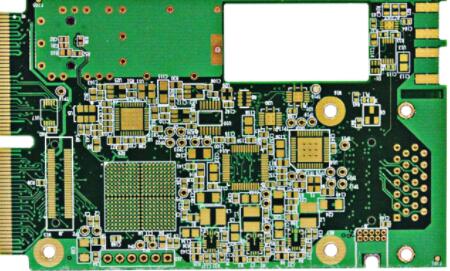Rogers RO4350B (Rogers high frequency board) hydrocarbon ceramics and Rogers RO4835 (Rogers high frequency board) hydrocarbon ceramics are both RO4000 series of materials, belonging to the civilian series. The RO4000 series is a hydrocarbon resin and ceramic filler laminate material. It is compatible with FR4 mixed pressure, FR-4 processing technology, and lead-free soldering process capabilities, ensuring that Rogers high-frequency board processing plants only need to have lower process processing Ability to reduce the customer’s Rogers high-frequency board processing cost, and its low loss (dielectric loss (Df) 0.0037@10GHz), better dielectric constant temperature stability (50ppm/°C@-50°Cto150°C), relatively Compared with the traditional PTFE material, the heat treatment ability will be better (heat dissipation coefficient 0.6W/m/°K), low Z-axis thermal expansion coefficient (31ppm/°C), improve the reliability of the through hole, etc., and can guarantee the radar front end at 24GHz And the excellent electrical performance required by the antenna. Moreover, it is also a UL94V-0 flame retardant material, which further contributes to the safety of the radar system.

The biggest difference between the two is that RogersRO4835 adds antioxidants, which has an oxidation resistance 10 times higher than that of traditional thermosetting materials, and it meets the requirements of IPC-4103 (substrate specifications for high-speed and high-frequency applications). Rogers high-frequency microwave radio frequency sheet RO4835 adds anti-oxidation materials, and its oxidation resistance is stronger than Rogers RO4350B. Except for the difference between Dk and Df, the temperature characteristics of Dk are relatively worse for products with glass cloth, and the requirements for the temperature range of the product are higher. The coefficient of thermal expansion becomes worse, especially in the z-axis, and the relative number of layers of the product will decrease. The phase characteristics of high frequency are relatively worse, and products with strict requirements on the phase should be avoided. The advantage is that the dimensional stability, hardness and water absorption of the product are relatively good.
The working frequency of 24G security radar system is 24~24.25GHz, with a total working bandwidth of 250MHz. It uses FMCW waveform to work. Due to its high frequency and short wavelength, it determines that the radio frequency front end and antenna of the radar system can only be used at high frequencies. High-frequency microwave materials, and the security industry is full of competition characteristics, so that high-frequency microwave materials not only need to have good performance, but also the price should be moderate, that is, high-frequency microwave materials with extremely high cost performance are needed.
ROGERS, an internationally renowned manufacturer and manufacturer of high-frequency microwave radio frequency board materials, focuses on the introduction of Rogers RO4350B (Rogers high frequency board) hydrocarbon ceramics and Rogers RO4835 hydrocarbon ceramics for the 24G security radar market and for different use scenarios. Frequency microwave radio frequency board material.